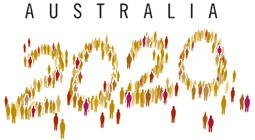When we moved to Kensington, over a year ago now, we were aware that we were joining a suburb that had something rather unique: its own lobby group. This group, the Kensington Association, was working hard to reunite the suburb of Kensington which, under Jeff Kennett, had half its region assigned to the Melbourne City Council for management, and the other half to the Moonee Valley City Council. This was an odd state of affairs and, in December last year, they succeeded in getting it corrected, with the whole suburb to move under the Melbourne City Council on the 1st July 2008 – i.e. next week.
Of course, there were two broad options for reuniting Kensington – everyone goes to Melbourne, or everyone goes to Moonee Valley. The Kensington Association was vocal in encouraging the Melbourne option, and one of the key reasons promoted was around waste services. A person set up at our local shops to promote their agenda promised me, since I was currently under Moonee Valley, that a shift to Melbourne would result in better street sweeping and the recycling bin being collected twice as frequently. Accordingly, I was convinced that shifting to Melbourne was the way to go.
Except this week, the Moonee Valley City Council took away our green waste bin. It turns out that all is not better with Melbourne City Council, as they don’t offer a regular, kerb-side garden waste collection service in any of their suburbs. Their option is for residents to store the garden waste somewhere, book a garden waste pick-up on a particular weekend per month, and when the council turns up, you need to help them load the waste onto their truck. Hmmm. In all of the Kensington Association’s research and publications on the merger, this little implication was strangely missing.
(And in Melbourne’s recent waste and recycling FAQ, it states that weekly recycling collection will not begin until October 2009, so this potential benefit touted by the Kensington Association is still a long way away.)
What makes the issue of green waste so relevant is that Kensington has a disproportionately large number of houses for an inner city suburb. Based on the data from a popular real estate website, we can construct the following table of suburbs that fall under Melbourne City Council’s management:
| Suburb | Separate Houses | Semi/Terraces | Flats |
|---|---|---|---|
| Kensington | 28% | 24% | 44% |
| North Melbourne | 8% | 33% | 52% |
| Parkville | 7% | 34% | 53% |
| West Melbourne | 5% | 60% | 21% |
| East Melbourne | 5% | 24% | 62% |
| Carlton | 1% | 34% | 54% |
| Southbank | 1% | 2% | 85% |
| CBD | 0% | 8% | 75% |
| St Kilda Rd | 0% | 0% | 87% |
And yes, I know that none of those rows add up to 100%, but that’s the way the numbers came. *shrug*
So, it’s clear that the Melbourne City Council’s not going to have much of an interest in providing a useful green waste service unless they do a special favour for Kensington ratepayers (and maybe those West Melbourne residents in their numerous terrace houses). Or maybe, our local lobby group (if you’re listening) can take a few minutes from their current campaign to save a park and help out those people you misinformed in your last campaign.
 I have been pretty interested in seeing the outcomes of the
I have been pretty interested in seeing the outcomes of the